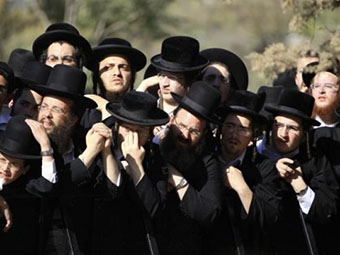 There is no such thing as a “secular Jew” as all Jewish existence is the product of a covenant with God, the president of the Union for Reform Judaism has said.
There is no such thing as a “secular Jew” as all Jewish existence is the product of a covenant with God, the president of the Union for Reform Judaism has said.
Writing in the Huffington Post, Rabbi Eric H. Yoffie, President Emeritus of the Union for Reform Judaism, the congregational arm of the Reform Jewish Movement in North America which represents 1.5 million Reform Jews in more than 900 synagogues across the United States and Canada, said that secular Jews are being self-delusional if they think otherwise.
“One of the most interesting things that I do as a rabbi is engage in conversations with people who define themselves as ‘secular Jews’ or ‘cultural Jews,’”Yoffie wrote.
“They refuse to accept the dictates of the divine or the absolutes of the Jewish religion — or any religion. They are ready, they say, to throw off the oppressive power of the past. If there is truth, they tell me, they insist on their right to shape it themselves. And yet, in their next breath, they assure me that they are ‘proud secular Jews.’ But where is the logic in that?”
Yoffie goes on to provide a valuable insight into what binds Jews into an ethnic brotherhood which does indeed transcend the purely religious—and illustrates why atheist Jews are just as welcome in Israel as the ultra-religious.
“Their act of belonging—and belonging to a people that for most of its history has been set apart and oppressed—is not reasonable at all; it is, in fact, a supreme act of irrationality, and yes, of faith. The very people who speak the language of personal freedom are subordinating their own personal freedom to the Jewish enterprise. Those who reject religious commitment in the name of self-expression are accepting, at least in some measure, the commitment of Jewish belonging.
“And when I point this out, and note that their Jewish identification contradicts their idea of critical thinking and unalloyed reason as the ultimate good, they tend to reply that, well, they are not identifying at all with religion but with the Jewish people.
“The first problem with this response, of course, is that embracing a people is no more rational an act than embracing God or religion. It too is an act of faith.
“And the second problem is that the Jewish people cannot be separated from God. The Jews came into being as a people at Sinai, waiting in readiness for the revelation of Torah; they are not now, and have never been, simply another ethnic grouping.
“For Jews, Jewish ethnicity does not stand apart from faith and community does not stand apart from Jewish law. Absent their religious essence, the Jewish people withers and dies.
“In my experience, Jewish secularists understand this on some level, even if they have trouble acknowledging it. No matter how much they may scoff at religious belief, if you ask them ‘WHY do you identify with the Jewish people?’ they will inevitably refer to values such as social justice, hospitality and mentschlikeit (decency) — values that are grounded in the sacred texts of Jewish religious tradition and that have endured solely because of the authority that the religious tradition imposes.
“And this too: Secular Jews, no matter how many times they say they have no faith, return again and again to places of faith. I usually, although not always, encounter them in the synagogue, which may be a venue for communal gathering but is, primarily and inarguably, a religious institution.
“The Jews as a people and a culture do not exist in isolation. God has made a covenant with them, and this covenant provides the ground for all Jewish existence.”
In other words, it is not “Zionism” per se which binds Jewish Supremacists: it is the ethnicity of Jewishness itself.



